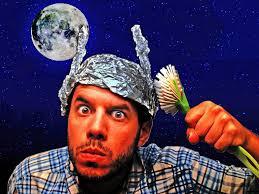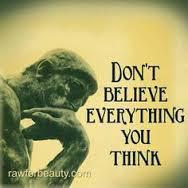Rob Brotherton’s Suspicious Minds: Why We Believe Conspiracy Theories starts off saying it won’t be a book cataloguing and debunking them. Instead it aims to explain the psychology underlying such beliefs.

The book’s key take-away is that conspiracy theories come from psychological quirks that are actually not the exclusive province of whackos, but affect us all. Our brains are products of a long evolution during which our ancestors faced many life-or-death challenges requiring quick intuitive responses. You had to be good at spotting predators. And if making a mistake, better make it on the safe side, of seeing something, even if it’s not really there.

Despite its opening disclaimer, Brotherton perhaps inevitably does fill many pages with the details and defects of popular conspiracy theories. The JFK assassination gets much attention; a majority of Americans believe it was a conspiracy. This illustrates one psychological factor: we are primed to suppose that big outcomes must have big causes. (Thus dice players, when shooting for a high number, instinctively throw the dice more forcefully.)

Another key psychological factor is confirmation bias. I’ve written before how our beliefs become impervious to correction, because we love information that seems to validate them, and shun anything that undermines them. Ironically, smarter people are more prone to this, because they are better at coming up with rationalizations to support their preconceptions and to reject contradictory data.

Our brains’ neuronal wiring changes as experiences are absorbed. It’s a canonical principle that neurons that “fire together wire together.” After finishing this book, I happened to read an article applying that to beliefs. A strongly held belief actually makes your brain’s wiring to go along the same pathway whenever the subject arises. Over time, this “fire together wire together” effect strengthens, as though etching grooves in the brain — making the belief ever more impervious to being modified.

Not surprisingly, the kind of mind that goes for one conspiracy theory is likely to buy others, even if unrelated. One Austrian study found that conspiracy-minded people would even agree with a completely made-up conspiracy theory. Such theories don’t even have to agree with each other. Brotherton notes that some conspiracists believe Osama bin Laden was actually killed back in ’02 and the fact was covered up, but also in theories that he’s actually still alive. A “Schrodinger’s terrorist?”
And radio nutball Alex Jones never met a conspiracy theory he didn’t like — Newtown, 9/11, the Oklahoma City and Boston Marathon bombings, you name it — all faked by government conspirators.

Alex Jones
(The fool in the White House appeared on Jones’s show and said Jones has an “amazing reputation.”)
What makes all such conspiracy theories ultimately laughable is the large number of (otherwise serious and responsible) people who would have to agree to be involved, and who would have to keep mom.
The book explores why some of us are more conspiracy minded than others. It has to do with the lens through which you view the world — how you think it works. A big factor is how much trust you have in general, and the degree of control you feel over your own life. But nobody feels totally in control or has absolute trust; we are all suspicious to a degree, indeed, all paranoid to a degree. This too is an evolutionary inheritance — suspicion was prudent for our ancestors, and surely even today there is much to be suspicious about — like e-mails from Nigeria. Brotherton also points out that the randomness factor in life is unsettling to us. Conspiracy theories are a way to impose some seeming order on a chaotic cosmos.
Belief in them also correlates with other departures from conventional paradigms — like belief in the supernatural, parapsychology, alternative medicine. Common to all is rejection of “what they want you to think,” so you can congratulate yourself as an independent mind. Opposition to vaccination and Genetic Modification fits right in with this too. (It’s “How Mumbo-Jumbo Conquered the World,” as the title of a book by Francis Wheen declares.)
Most conspiracy theories spin together facts and evidence, even if drawing from them tortured conclusions. JFK is again a case in point; conspiracists are fountains of details. But evidence isn’t strictly necessary.

I wrote in the margin, “He knows this how?”
Advertisements